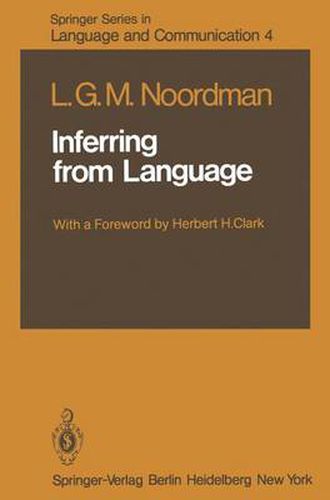Readings Newsletter
Become a Readings Member to make your shopping experience even easier.
Sign in or sign up for free!
You’re not far away from qualifying for FREE standard shipping within Australia
You’ve qualified for FREE standard shipping within Australia
The cart is loading…






This title is printed to order. This book may have been self-published. If so, we cannot guarantee the quality of the content. In the main most books will have gone through the editing process however some may not. We therefore suggest that you be aware of this before ordering this book. If in doubt check either the author or publisher’s details as we are unable to accept any returns unless they are faulty. Please contact us if you have any questions.
In the study of human thought there could hardly be a more fundamental con cern than language and reasoning. In the tradition of Western philosophy, humans are distinguished by their ability to speak and to think rationally. And language is often considered a prerequisite for rational thought. If psycholoQists, then, are ever to discover what is truly human about their species, they will have to discover how language is produced and understood, and how it plays a role in reasoning and other forms of rational thought. Within psychology there has been an imperative to study language and rea soning together. Since Wundt, psychologists have succeeded in building a the oretical foundation for both language and reasoning. What has become clear from these beginnings is that the two are inextricably bound to each other. Like the two players ina chess game, take away one of them and the game no longer exists. On the one hand, producing and understanding speech re quires an intricate process of reasoning. Speakers must rationally choose sentences that will affect their listeners in ways they intend, and listen ers must infer what speakers could conceivably have meant in selecting the sentences they did. Reasoning, inference, and rational thought lie at the very center of speaking and listening. On the other hand, logical reasoning begins with, and is influenced by, the language in which a problem is stated.
$9.00 standard shipping within Australia
FREE standard shipping within Australia for orders over $100.00
Express & International shipping calculated at checkout
Stock availability can be subject to change without notice. We recommend calling the shop or contacting our online team to check availability of low stock items. Please see our Shopping Online page for more details.
This title is printed to order. This book may have been self-published. If so, we cannot guarantee the quality of the content. In the main most books will have gone through the editing process however some may not. We therefore suggest that you be aware of this before ordering this book. If in doubt check either the author or publisher’s details as we are unable to accept any returns unless they are faulty. Please contact us if you have any questions.
In the study of human thought there could hardly be a more fundamental con cern than language and reasoning. In the tradition of Western philosophy, humans are distinguished by their ability to speak and to think rationally. And language is often considered a prerequisite for rational thought. If psycholoQists, then, are ever to discover what is truly human about their species, they will have to discover how language is produced and understood, and how it plays a role in reasoning and other forms of rational thought. Within psychology there has been an imperative to study language and rea soning together. Since Wundt, psychologists have succeeded in building a the oretical foundation for both language and reasoning. What has become clear from these beginnings is that the two are inextricably bound to each other. Like the two players ina chess game, take away one of them and the game no longer exists. On the one hand, producing and understanding speech re quires an intricate process of reasoning. Speakers must rationally choose sentences that will affect their listeners in ways they intend, and listen ers must infer what speakers could conceivably have meant in selecting the sentences they did. Reasoning, inference, and rational thought lie at the very center of speaking and listening. On the other hand, logical reasoning begins with, and is influenced by, the language in which a problem is stated.